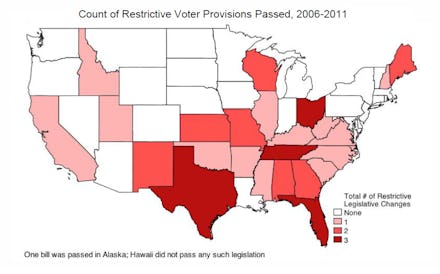This Study Confirms Everything You Suspected About Voter ID Laws

The news: According to new research by University of Massachusetts Boston sociologist Keith Bentele and political scientist Erin O'Brien, the states that have enacted tougher voter ID laws in the past few years are also the same states where both minority and lower-income voter turnout had increased in recent years.
Focusing further analysis on just 2011, when the vast majority of voter ID regulations were passed, the researchers found that states which passed the legislation were highly likely to have:
- Republicans in control of both houses of the state legislature and the governorship
- Strong probabilities of being swing states in the 2012 elections
- Minority turnout which was higher in the 2008 election and with high proportions of African-American voters
- Larger numbers of allegations of fraud in 2004, though these had a "much smaller substantive impact relative to partisan and racial factors"
The authors note that the study's results carry ominous implications and demonstrate voter ID laws have "an uncomfortable relationship to the political activism of blacks and the poor." Their paper further situates voter ID within a realm of policies that "collectively reduce electoral access among the socially marginalized."
In other words: Their research adds substantial support to the claim popular among the left and even some former Republicans that stricter voter ID requirements has little to do with purported voter fraud and everything to do with preserving GOP majorities in election results against widening opposition. The fact of the matter is that voter ID laws overwhelmingly affect minorities and the poor.
Even a study preferred by the conservative Heritage Foundation's Hans von Spakovsky found that "registered voters without photo IDs tended to be female, African-American, and Democrat."
As the former Republican Jeremiah Goulka wrote: "The more I thought about it, the more I understood why Democrats claim that these laws are racist. By definition, a law that intentionally imposes more burdens on minorities than on whites is racist, even if that imposition is indirect. Seeing these laws as distant relatives of literacy tests and poll taxes no longer seemed so outrageous to me."
And many Republicans have been pretty open about the fact that they view voter ID restrictions as a ticket to electoral victory.
AND Magazine's Fraser Sherman writes that, "When it reaches the point you think saving democracy means stopping Them from voting (whoever your particular Them might be), you're doing it wrong." It's been made abundantly clear this is the intent and function of voter ID.